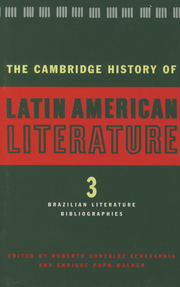Book contents
- Frontmatter
- Introduction to Volume 3
- 1 The literary historiography of Brazil
- 2 Colonial Brazilian literature
- 3 Brazilian poetry from the 1830s to the 1880s
- 4 Brazilian poetry from 1878 to 1902
- 5 The Brazilian theatre up to 1900
- 6 Brazilian fiction from 1800 to 1855
- 7 The Brazilian novel from 1850 to 1900
- 8 Brazilian fiction from 1900 to 1945
- 9 Brazilian prose from 1940 to 1980
- 10 The Brazilian short story
- 11 Brazilian poetry from 1900 to 1922
- 12 Brazilian poetry from Modernism to the 1990s
- 13 The Brazilian theatre in the twentieth century
- 14 Brazilian popular literature (the literatura de cordel)
- 15 Literary criticism in Brazil
- 16 The essay: architects of Brazilian national identity
- 17 The Brazilian and the Spanish American literary traditions: a contrastive view
- Bibliography
- Index
- References
8 - Brazilian fiction from 1900 to 1945
Published online by Cambridge University Press: 28 March 2008
- Frontmatter
- Introduction to Volume 3
- 1 The literary historiography of Brazil
- 2 Colonial Brazilian literature
- 3 Brazilian poetry from the 1830s to the 1880s
- 4 Brazilian poetry from 1878 to 1902
- 5 The Brazilian theatre up to 1900
- 6 Brazilian fiction from 1800 to 1855
- 7 The Brazilian novel from 1850 to 1900
- 8 Brazilian fiction from 1900 to 1945
- 9 Brazilian prose from 1940 to 1980
- 10 The Brazilian short story
- 11 Brazilian poetry from 1900 to 1922
- 12 Brazilian poetry from Modernism to the 1990s
- 13 The Brazilian theatre in the twentieth century
- 14 Brazilian popular literature (the literatura de cordel)
- 15 Literary criticism in Brazil
- 16 The essay: architects of Brazilian national identity
- 17 The Brazilian and the Spanish American literary traditions: a contrastive view
- Bibliography
- Index
- References
Summary
The twentieth century opened in Brazil with an atmosphere of intense political and economic interest but without a corresponding intensity in a literary manifestation. In the Amazonian area, Brazil’s “last frontier,” the rubber boom which had begun around 1860 was nearing its peak, focusing both public interest and international speculation upon the “exotic rainforest.” The abolition of slavery in 1888 had resulted in large-scale appeals by the Brazilian government to certain foreign nations for the immigration of families with agricultural experience, bringing to Brazil thousands of Italian, German, and (after 1908) Japanese families. On the political scene, the advent of the Republic in 1889 had brought a decade of opportunism, austerity, factional unrest, and general disappointment to the country and, as the century turned, Brazilian intellectuals were in the throes of intense national self-examination in an attempt to discover whether Brazil was indeed in a period of progress or of decadence and whether the nation merited any kind of confidence at home or abroad. Reactions ranged from euphoric admiration (Afonso Celso, For que me ufano do meu pais, 1900) to pessimistic condemnation (Euclides da Cunha, Os sertões, 1902 [Rebellion in the Backlands]). Essayists throughout Brazil found their most fertile field of endeavor in the analysis of national strengths and weaknesses and the attempt to identify solutions to the latter. The perennial presence of national self-consciousness in Brazilian thought as the twentieth century began to run its course may be verified in the writings of essayists such as Alberto Torres (O problema nacional brasileiro [1914]), Monteiro Lobato (Idéias de Jeca Tatu [1919]), and Paulo Prado (Retrato do Brasil [1928]). Its pervasiveness in the genre of prose fiction will be observed throughout the present chapter.
- Type
- Chapter
- Information
- The Cambridge History of Latin American Literature , pp. 157 - 188Publisher: Cambridge University PressPrint publication year: 1996
References
- 1
- Cited by

